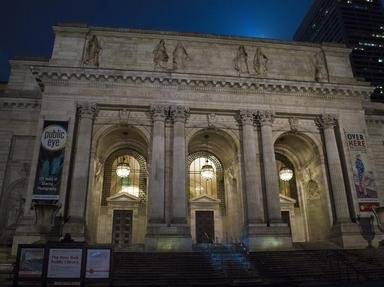Quiz Answer Key and Fun Facts
1. Which character says, "Everyone suspects himself of at least one of the cardinal virtues, and this is mine: I am one of the few honest people that I have ever known"?
2. Who speaks the moving words, "We don't own your laws; we don't own your country; we stand here as free, under God's sky, as you are; and, by the great God that made us, we'll fight for our liberty till we die"?
3. Who speaks these lines? "Come up hither, Hester, thou and little Pearl....Ye have both been here before, but I was not with you. Come up hither once again, and we will stand all three together!"
4. Which literary character advises, "Don't ever tell anybody anything. If you do, you start missing everybody"?
5. Which woman speaks the famous line, "Whoever you are-I have always depended on the kindness of strangers"?
6. Who delivers the following lines? "O, that's what troubles me, papa. You want me to live so happy, and never have any pain,--never suffer anything,--not even hear a sad story, when other poor creatures have nothing but pain and sorrow, all their lives;--it seems selfish. I ought to know such things, I ought to feel about them! Such things always sunk into my heart; they went down deep; I've thought and thought about them. Papa, isn't there any way to have all slaves made free?"
7. Which character asks, "Shall we never, never get rid of this Past...It lies upon the Present like a giant's dead body"?
8. These words are attributed to which literary character? "It's so hard for me to believe in [time]. Some things go. Pass on. Some things just stay. I used to think it was my rememory. . . . But it's not. Places, places are still there. If a house burns down, it's gone, but the place-the picture of it-stays, and not just in my rememory, but out there, in the world."
9. Who lists the following complaints? "I cannot go to school today. I have the measles and the mumps,/ A gash, a rash and purple bumps./ My mouth is wet, my throat is dry,/ I'm going blind in my right eye.../ Whats that you say?/ You say today is...Saturday?/G'bye, I'm going out to play!"
10. Which character says, "They were beaten to start with. They were beaten when they took them from their farms and put them in the army. That is why the peasant has wisdom, because he is defeated from the start. Put him in power and see how wise he is"?
11. What man speaks these words, "Whenever they's a fight so hungry people can eat, I'll be there. Whenever they's a cop beatin' up a guy, I'll be there . . . . I'll be in the way guys yell when they're mad an'-I'll be in the way kids laugh when they're hungry an' they know supper's ready. An' when our folks eat the stuff they raise an' live in the houses they build-why, I'll be there"?
12. What twisted literary character opines, "For the bright side of the painting I had a limited sympathy. My visions were of shipwreck and famine; of death or captivity among barbarian hordes; of a lifetime dragged out in sorrow or tears, upon some gray or desolate rock, in an ocean unapproachable and unknown"?
13. Which character raves, "I been silent so long now it's gonna roar out of me like floodwaters and you think the guy telling this is ranting and raving my God; you think this is too horrible to have really happened, this is too awful to be the truth! But, please. It's still hard for me to have a clear mind thinking on it. But it's the truth even if it didn't happen"?
14. Which simple literary character states, "I would prefer not to"?
15. Fill in the blank here to get the speaker's name. "Call me ________. Some years ago - never mind how long precisely - having little or no money in my purse, and nothing particular to interest me..."
16. To whom is the following quote attributed? "Like it? Well I don't see why I oughtn't to like it. Does a boy get a chance to whitewash a fence every day?"
17. Which character gives the opinion, "'T would have been a cruel and an unhuman act for a white-skin; but 't is the gift and natur' of an Indian, and I suppose it should not be denied"?
18. Which woman asks, "Wouldn't it be fun if all the castles in the air which we make could come true and we could live in them"?
19. Who makes the following speech? "I'm sick of the hypocrisy that would bury alive a woman of her age if her husband prefers to live with harlots... Women ought to be free - as free as we are."
20. Who speaks the following rhyme? "Would you eat them in a box? Would you eat them with a fox?"
Source: Author
image22
This quiz was reviewed by FunTrivia editor
agony before going online.
Any errors found in FunTrivia content are routinely corrected through our feedback system.

